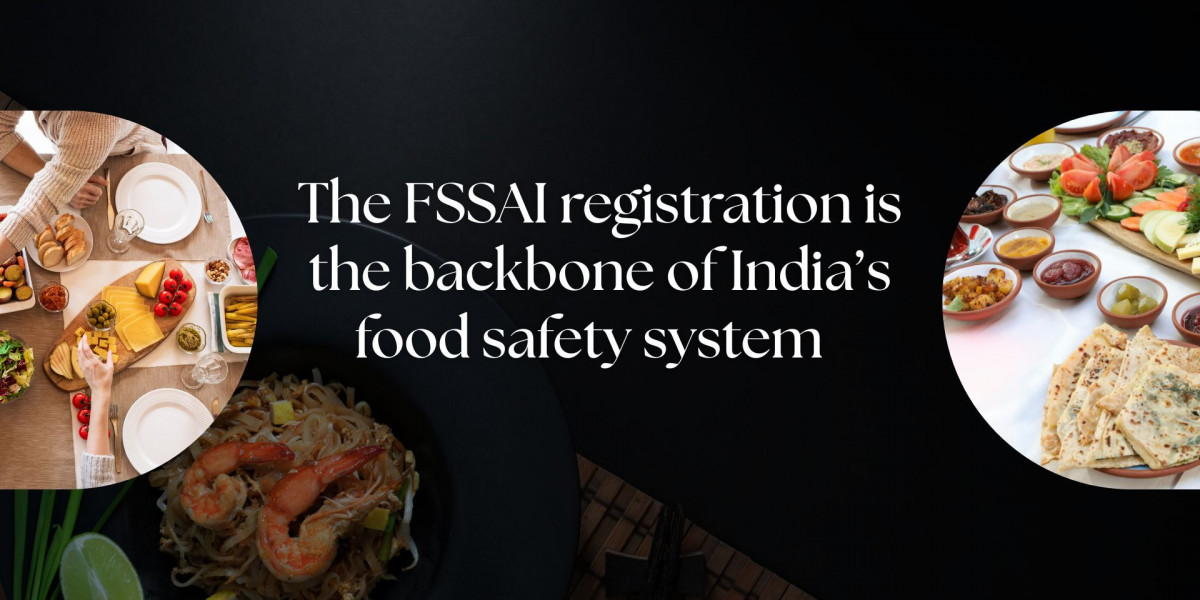In a vast and diverse country like India, where millions of food products are prepared, sold, and consumed daily, ensuring food safety is no small feat. The Food Safety and Standards Authority of India (FSSAI) stands at the heart of this mission; it acts as a guardian of public health and consumer trust. The FSSAI registration is the backbone of India’s food safety system. Now a generation of people are buying some food items before they check the safety standards. The FSSAI logo gives the trust to the consumers. So even small food vendors also register with the FSSAI. And follow the FSSAI standards.
What is FSSAI registration?
FSSAI registration is compulsory for anyone engaged in the food industry in India. It is authorised by FSSAI, the Food Safety and Standards Authority of India (FSSAI). A compliance authority under the control of the Ministry of Health and Family Welfare. This registration confirms that a food business meets the guidelines and norms, ensuring the safety and quality of food items.
Entities Eligible for FSSAI Registration:
FSSAI Basic Registration (FSSAI Licence Type A):
Applicable for small-scale food businesses, including petty retailers, small-scale manufacturers, and food processors whose annual turnover does not exceed ₹12 lakhs. Basic registration is suitable for businesses with limited operations and low turnover.
Small food manufacturers, processors, or repackers
Street food vendors and hawkers
Temporary or mobile food stalls
Small retailers or shopkeepers selling food items
Cottage industries related to food
Small-scale storage or distribution units
FSSAI State License (FSSAI License Type B):
Applicable for medium-sized food businesses, including manufacturers, storage units, transporters, retailers, marketers, and distributors. Required for businesses with an annual turnover between ₹12 lakhs and ₹20 crores.
Mid-sized food manufacturers and processors
Medium restaurants and food catering businesses
Hotels with limited capacity (usually up to 4-star)
Food transporters and warehouses operating within a single state
Medium-sized traders, retailers, or distributors
FSSAI Central License (FSSAI License Type C):
Applicable for large-scale food businesses with operations across multiple states or with an annual turnover exceeding ₹20 crores.
Large-scale food manufacturers, exporters, and importers
5-star hotels and large restaurant chains
Food processing units with large production capacities
Central government-operated food facilities
Food businesses involved in the export or import of food items
E-commerce food platforms operating across states
The Importance of Why FSSAI Registration is the Backbone of India’s Food Safety System
India's food industry is the largest in the world. Including local vendors and small-scale producers to massive multinational corporations.
The FSSAI system is born from food quality and food safety standards. Food safety is very important. So the FSSAI is implementing food safety standards for consumer health.
FSSAI registration forms the foundation of India’s food regulatory framework, ensuring that every food business — big or small — is accountable for the safety, hygiene, and quality of the food it provides.
Ensures Consumer Safety and Trust:
The aim of FSSAI is to protect consumers' health from unsafe food or adulterated food. The FSSAI registration is mandatory for all food entrepreneurs in India. And also to follow the instructions like hygiene, labelling, and quality standards, ensuring that what reaches the consumer is safe to eat. The FSSAI logo builds the trust to buy the food products for consumers.
Brings Uniformity and Accountability:
The FSSAI comes before multiple departments implement the food instructions, but they are not controlling the adulterated food. After that comes FSSAI to treat it like a single umbrella, creating standardised rules and clear accountability for all food operators. The FSSAI monitors every food business and tracks their hygiene.
Promotes Hygiene and Quality Compliance:
FSSAI registration enforces mandatory adherence to specific food safety management systems (FSMS), hygiene standards, and periodic inspections. This continuous compliance framework not only improves food quality but also promotes safe food handling practices across the supply chain — from production to consumption.
Facilitates Market Access and Business Credibility:
Through the FSSAI registration to access business credibility. It becomes easier for registered entities to expand operations, collaborate with other businesses, or access new markets. Many e-commerce and retail platforms only list FSSAI-registered brands, making registration essential for business growth and consumer acceptance.
Strengthens India’s Food Ecosystem:
At a macro level, FSSAI registration helps the government collect data, monitor the industry, and implement policies that promote public health and sustainable food practices. It bridges the gap between regulation and innovation by encouraging food businesses to adopt safe, modern, and transparent production methods.
Safeguards Public Health:
The main purpose of FSSAI is to protect public health. So, FSSAI registration plays a crucial role for every food entrepreneur. It helps in eliminating contaminated, adulterated, or substandard food from the market. By regulating hygiene, processing, and packaging standards, FSSAI minimises health risks such as foodborne diseases and contamination.
Required documents for the FSSAI registration:
Identity proof of the applicant.
Provide proof of the business premises.
Proof of the business constitution.
Photograph of the applicant.
Food safety plan.
List of food products.
NOC.
Import and export code.
Process of FSSAI registration:
Step 1: Visit the official portal of FSSAI Registration.
Step 2: Select the option of type of registration.
Step 3: Fill the application form like this:
Name of business
Name of applicant.
Email ID and mobile number.
Address of the business.
Date of incorporation.
Kind of business.
Select the registration type.
Registration tenure.
State and district pincode.
Additional details about the businesses.
Business proof.
Step 4: Enter the verification code.
Step 5: Submit the application.
Here you can renew your FSSAI registration certificate.
Benefits of FSSAI Registration:
Legal Authorisation and Compliance:
Ensures compliance with food safety laws under the FSS Act, 2006.
To register the FSSAI avoids penalties, and without FSSAI operation is illegal, and the result is very heavy fines or shutdowns.
Consumer Awareness and Preference:
Now a generation of many people before buying the food check the FSSAI logo or registration certificate.
Helps in Business Image and Marketing:
The logo of FSSAI indicates a quality assurance mark, enhancing customer appeal.
To register with FSSAI adds professionalism to your business.
Legal Support and Government Benefits:
Through the FSSAI registration, access to lots of government benefits and schemes.
It helps to increase your business growth.
Standardisation of Food Quality:
The FSSAI stands for quality control and monitoring in the production process.
Ensures that food products meet uniform standards for hygiene and safety.
Conclusion:
In essence, FSSAI registration forms the backbone of India’s food safety system by combining legal enforcement with public trust. The FSSAI Registration Portal is an important, user-friendly platform that enables small and medium food establishments to effectively comply with food safety regulations. By obtaining FSSAI registration or a licence through this portal, businesses can fulfil legal obligations, strengthen consumer confidence, and gain broader market access. Approval of the FSSAI registration process is a crucial step towards sustainable development, trust, and success in the competitive food sector.








